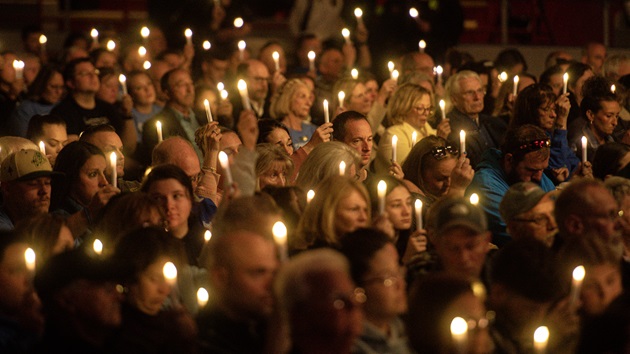
(LEWISTON, Maine) — Dozens of survivors and families of victims of the 2023 mass shooting in Maine are suing the federal government over its “negligence” in failing to address “known dangers” posed by the Army reservist who would go on to kill 18 people.
Lawyers for about 100 survivors and families of victims announced their intent to sue the government last October. Now, with no response or acknowledgement, the group said, they are officially filing suit.
At least 18 people were killed and more than a dozen others injured after a gunman opened fire at two locations in Lewiston, Maine: a bowling alley where a children’s league was taking place and a local bar. The massacre was one of the deadliest shootings in U.S. history.
The gunman, Robert Card, displayed multiple warning signs in the weeks and months leading up to the shooting, including a clear pattern that was known to the Army, but to which they did not respond, the 119-page suit alleged.
“Well before the mass shooting, the Army was aware that Robert Card had classic warnings signs of high risk to himself and the public. The Army’s knowledge; its mandatory processes; its promises to Card’s family, medical providers and local law enforcement; and its actions in undertaking to intervene individually and in combination created a legal duty on the part of the Army to address the risks posed by Card in a reasonable manner,” the suit said.
The actions that should have been taken were buttressed by a wealth of knowledge of the “unique risks” service members with “mental health crises” pose to “themselves and the public,” but instead those policies were “violated” in failing to take “mandatory action” with Card, according to the suit.
“The Army knew that the combination of mental health deterioration, blast-induced brain injury, access to weapons, and paranoid delusions required immediate and decisive intervention to prevent tragedy,” the suit said. “The Army had mandatory reporting systems, crisis intervention protocols, and state law utilization procedures designed for such situations.”
The Army’s own investigation into what led up to the shooting found, among other things, “multiple communication failures between military and civilian hospitals, as well as with SFC Card’s chain of command,” as ABC News has previously reported. Those failures “impacted” Card’s “continuity of care,” and possibly, could have prevented him from wielding weapons as he did, the investigation found.
The group’s suit now seeks “accountability from the U.S. Army, Department of Defense, and Keller Army Community Hospital after those institutions ignored warning signs of the dangers posed by Army Reserve Sergeant, Robert Card, including Card’s threat six weeks before the tragedy that he planned to commit a mass shooting.”
Copyright © 2025, ABC Audio. All rights reserved.




